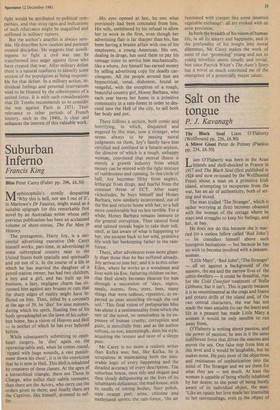Suburban Inferno
Francis King
Bliss Peter Carey (Faber pp. 296, £6.50) mephistophilis's stonily despairing 'Why this is hell, nor am I out of it', in Marlowe's Dr Faustus, might stand as a suitable epigraph for this remarkable first novel by an Australian writer whose only previous publication has been an acclaimed volume of short-stories, The Fat Man in History.
The protagonist, Harry Joy, is a successful advertising executive (Mr Carey himself works, part-time, in advertising) in some subtropical country near to the United States both spatially and spiritually and yet not of it. In the course of a life in which he has married the daughter of a petrol-station owner, has had two children, a boy and a girl, and has built up his business, a lazy, negligent charm has cocooned him against any bruises or cuts that the sharp edges of reality might have inflicted on him. Then, felled by a coronary at the age of 39, he 'dies' for nine minutes, during which his spirit, floating free of his body spreadeagled on the lawn of his suburban home, has a vision of Heaven and Hell — in neither of which he has ever believed before.
While subsequently submitting to openheart surgery, he 'dies' again on the operating-table and, when he comes round, 'ripped with huge wounds, a vast punishment down his chest', it is in the conviction that he is now in Hell. This Hell is inhabited by creatures of three classes. At the apex of a hierarchical triangle, there are Those in Charge, who inflict their subtle torments; then there are the Actors, who carry out the orders given to them; and finally there are the Captives, like himself, doomed to suffer. His eyes opened at last, he. sees what previously had been concealed from him. His wife, embittered by his refusal to allow her to work in the firm, even though her advertising flair is far sharper than his, has been having a brazen affair with one of his employees, a young American. His son, dealing in drugs, has used them to pay his teenage sister to service him mechanically, like a whore. Joy himself has earned money by selling advertising copy for deadly carcinogens. All the people around him are hypocritical, venal, dishonest, brutal or vengeful, with the exception of a tough, beautiful country girl, Honey Barbara, who each year leaves her home in a primitive community in a rain-forest in order to descend into the Hell of the city, to sell both her body and pot.
There follows a section, both comic and horrifying, in which, disquieted and angered by this man, now a stranger, who seems always to be passing moral judgments on them, Joy's family have him certified and confined in a lunatic-asylum, the director of which is a tough, unhappy woman, convinced that mental illness is merely a growth industry from which money can be minted with the right mixture of ruthlessness and cunning. In this circle of hell, Joy becomes filthy from neglect, lethargic from drugs, and fearful from the constant threat of ECT. After many vicissitudes, he buys himself and Honey Barbara, now similarly incarcerated, out of the bin and returns home with her, to a hell more comfortable but no less terrible. For a while, Honey Barbara remains immune to the general corruption. Then tainted food and tainted morals begin to take their toll, until, at last aware of what is happening to her, she escapes back to her wild, primitive life with her beekeeping father in the rainforest.
There, after adventures even more ghastly than those that he has suffered already, Joy arrives to join her; and it is in this other Eden, where he works as a woodman and lives with his Eve, fathering children on her, that Hell slowly becomes Heaven for him through a succession of 'days, nights, meals, storms, fires, trees, bees, many things that were tedious, repetitive, as expected as peas uncurling through the red soil.' This final vision of prelapsarian bliss has about it a sentimentality from which the rest of the novel, so remorseless in its exposure of human cruelty, corruption and guile, is mercifully free; and as the author softens, so too, interestingly, does his style, acquiring the texture and taste of a sleepy pear.
Mr Carey is no more a realistic writer than KafIca was; but, like Kafka, he is scrupulous in maintaining both the inexorable logic of every happening and the detailed accuracy of every description. The suburban house, once tidy and elegant and then slowly deliquescing as the lives of its inhabitants deliquesce; the mad-house, with its smells of rotting bodies, floor polish, stale orange peel, urine, chlorine and methylated spirits; the rain-forest, 'the air festooned with creeper like some deserted vegetable exchange': all are evoked with an eerie precision.
In both the breadth of his vision of human life, in all its misery and happiness, and in the profundity of his insight into moral dilemmas, Mr Carey makes the work of most of our 'promising' young and not so young novelists seems tinselly and trivial. Not since Patrick White's The Aunt's Story has a novel so much convinced me of the emergence of a potentially major talent.






































 Previous page
Previous page